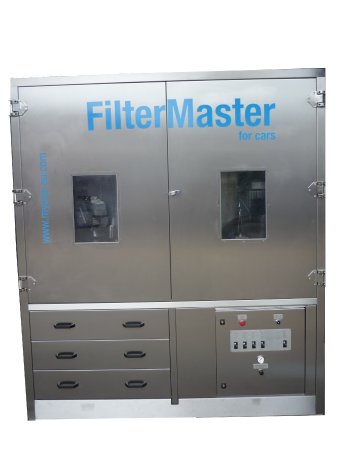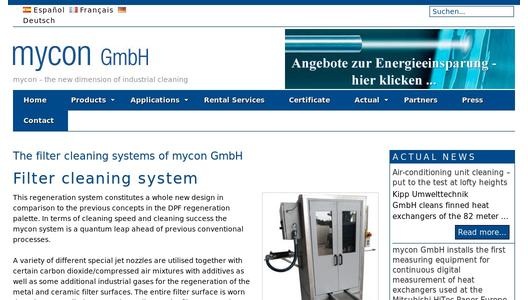Until today, car filters had to be separated - in most cases by using a disk grinder – and then welded again after cleaning. Afterwards, the filter housing needed to be blasted mostly with glass beads or glass breakage in order to avoid rust formation on the welding seams. Due to the new patented mycon method “FilterMaster for cars”, this complex procedure, which had been used earlier, has been entirely omitted. The method cleans efficiently and neatly car filters without the need to separate them. Besides the complete value retention of the filter, cleaning is even more cost-efficient by omitting the above mentioned working steps (separating, welding, blasting).
For about a year, a higher three-digit number of particle filters (DPF) have been so far cleaned up by using the method. Up to now, there was no complaint for cleaning completely without separation. The cleaning method without filter separation maintains the complete quality of the whole filter.
Negative statements of a competitor, which is also concerned with the cleaning method “FilterMaster for cars”, recently caused mycon being the plant manufacturer to commission performing another analysis - in addition to the already existing examinations. The examination of the catalytic capacity of a diesel particle filter (DPF) before and after the treatment with the used mild used substance - which would even be potable before use, if need would be - was in the focus.
Then the investigations of Dr. Thorsten Wagner, of the chair for the chemistry of the University Paderborn, also confirmed again the finding of the practice. The catalytic capacity of the filters is constant before and after admission flow of the substance taking the measuring tolerance into consideration. Regarding this, in the meantime, the company DPF Clean signed a declaration of discontinuance.
Beside the automobile manufacturers - who of course practice such investigations are more complicated - mycon and the cooperation association “FilterMaster DPF for filter cleaning without separation” are among the few companies on the market which practice such corresponding scientific proofs for their procedures. Of some other service providers in the field of the cleaning of DPF it is known that the listed “TÜV examinations” only refer to a comparison of the through-flow behaviour of the new and cleaned filters. However, the through-flow behaviour does not indicate if the filter is still functioning.
Such filters could show damages and only have a more or less limited catalytic capability, whereas the through-flow behaviour will not show any abnormalities. For the deployment of aerosols used for the method “FilterMaster for cars” it is now proven by the examination that the catalytic capacity is constant before and after the cleaning. An excerpt of the report about the catalytic capacity can be found on the website of mycon and of the cooperation association. If required, the complete inspection report, which is a more comprehensive scientific report, can be submitted upon request.


